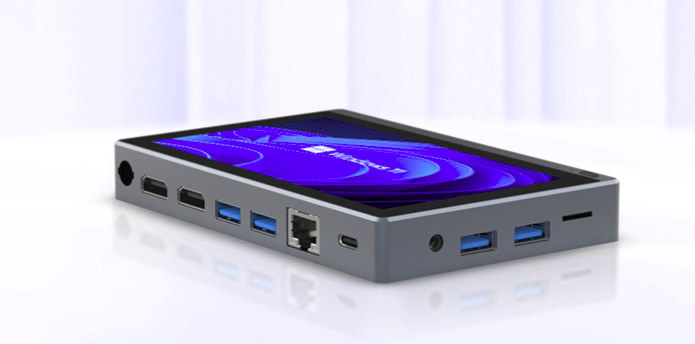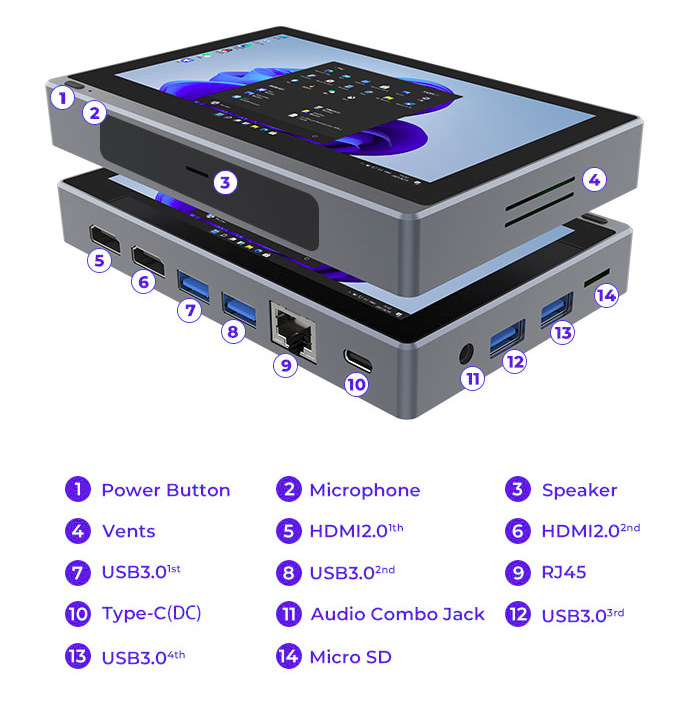GOLE1 was quite a unique mini PC when it launched in 2016 as it included a 5-inch touchscreen display. HIGOLE is now back with the GOLE1 Pro based on a similar design, but a slightly larger 5.5-inch touchscreen display, and much better specs suitable for 2022’s software and entry-level use cases.
The Atom x5-Z8300 “Cherry Trail” processor found in the original device gives way to an Intel Celeron N4200 or J4125 Gemini Lake processor, and the GOLE1 Pro mini PC, which the company sometimes also calls “HIGOLE PC 2022”, comes with up to 8GB LPDDR4X, a 128GB SSD, Gigabit Ethernet, WiFI 6 or 5, four USB 3.0 ports, and more.
GOLE1 Pro specifications:
- SoC (one or the other)
- Intel Celeron J4125 quad-core processor @ 2.00 GHz / 2.70 GHz (Turbo) / 2.4 GHz (Turbo all cores) with 12EU Intel UHD Graphics 600 @ 250 MHz / 750 MHz (Turbo); 10W TDP
- Intel Celeron N4000 dual-core Gemini Lake processor @ 1.1GHz / 2.6GHz (Turbo) with 12EU Intel UHD Graphic 600 @ 200 MHz / 650 MHz (Turbo); 6W TDP
- System Memory – 8GB LPDDR4X
- Storage – 128GB SSD, MicroSD card reader
- Display – 5.5-inch touchscreen
- Video Output
- 2x HDMI 2.0 ports up to 4Kp60
- Three independent displays supported if we include the built-in 5.5-inch display
- Audio
- 3.5mm audio jack
- Built-in speaker and microphone
- Digital audio output via HDMI ports
- Networking
- Gigabit Ethernet RJ45 port with Wake-on-LAN and PXE support
- Wireless
- WiFi 6 and Bluetooth 5.2 for the Celeron J4125 model
- WiFi 5 and Bluetooth 5.0 for the Celeron N4000 model
- USB – 4x USB 3.0 Type-A ports, 1x USB Type-C port
- Security – TPM 2.0
- Misc – Power Button, vents for cooling the fanless system
- Battery – 5,000 mAh battery good for three hours
- Power Supply – 12V via USB Type-C port
- Dimensions – 142 x 91.2 x 17.76 mm
- Weight – Around 200 grams
While the original GOLE1 would support Android 5.1 and Windows 10, the new GOLE1 only ships with Windows 11 Pro operating system, and Android has been dropped. Ubuntu and Linux are also listed as supported, although it’s unclear whether the company has tested them. It seems 12V-only power adapters with a USB-C port are now definitely among us, so the times when we could innocently plug any USB-C power adapter are over and done 🙂
HIGOLE launched the product on Indiegogo with a lowly ~$2,550 US funding goal. Rewards start at $199 for the early bird GOLE1 Pro with N4000, and $229 for the model with J4215 both with Windows 11 Pro preinstalled. Shipping adds about $20 worldwide and deliveries are expected for September 2022.
Via Liliputing

Jean-Luc started CNX Software in 2010 as a part-time endeavor, before quitting his job as a software engineering manager, and starting to write daily news, and reviews full time later in 2011.
Support CNX Software! Donate via cryptocurrencies, become a Patron on Patreon, or purchase goods on Amazon or Aliexpress








I’ve noticed Acer XC desktops with the J4125 have been dropping for $88 lately:
https://slickdeals.net/newsearch.php?src=SearchBarV2&searcharea=deals&searchin=first&q=j4125
Potentially worth it for somebody, but I want to see newer Atom chips hit the bargain bin, and the arrival of the 8-core.
You talked about this on a different news post. What’s happening? Stuff blowing up?
Yes, if somebody use a 12V non-compliant USB-C power supply into a 5V USB Type-C device it will fry it. I’m not sure what happens if one plug that same 12V power adapter into a USB-PD compliant plug though.
That’s not how USB-C works. Whenever you plug a USB cable into a computer or device, the devices at either end of the cable handshake and ask each other what protocols are supported by each other. They then negotiate what role each will play to each other. Eg in the case of my portable monitor and laptop, my monitor tells my pc it supports 12V but can handle 15V (if 12V isn’t available from the laptop) then the monitor tells the pc it is a USB hub, and that it is a 4K monitor. The laptop then acknowledges what it can do, what it needs to do. When this is done, the voltage jumps from 5V to 12V powers the monitor and engages USB hub protocol, and the USB video protocol. That is to say it starts at 5V and switches to the requested voltage after handshake negotiation.
The USB-C protocol is not 1 protocol, but about 30+ protocols. My laptop has 2 USB-C PD sockets, either one supports power in (charging from PSU or portable battery pack) or out (charging other devices, powering monitors etc), 5V, 12V and 15V. And both support USB-C Video protocol, so I can carry my laptop, a 2nd monitor and 1 cable instead of multiple and the various power supplies. I can take them to a meeting and the laptop will power everything.
In some situations you have USB-C cables specific applications in mind and have chips inside them. These usually have documentation with them to alert you to this fact, informing you what they can and cannot do with them.
What happens when a dumb (not USB PD compliant) power supply outputs 12V, 20V, or whatever and it’s plugged into a USB PD compliant host?
That power supply will not communicate its capabilities with the host, and only output a fixed voltage.
> That is to say it starts at 5V
Nope, a ‘dumb’ 12V power brick with USB-C cable/connector will output 12V.
And while standards compliant devices with an USB-C port should have overvoltage protection I doubt that every device I own supposed to be powered by ‘dumb’ 5V USB-C chargers or A-to-C adapter cables does implement this.
not Cool!, putting a hot girl on the video front and then having a weirdo guy who can hardly speak english doing the talking :p
another reason first reading specifications :
on previous usb-pd discussion:
usb-pd (epr) is up to 48V (since USB Power Delivery Rev. 3.1 (V. 1.0), now <=V. 1.2), >100W needs custom, epr marked, cable), hot plugging advertised for universal serial bus devices and no one ever expecting software influence to power delivery
> on previous usb-pd discussion
That happened where?
meant: expanding on previous postings here
( pd negotiation difficulties will get even more attention with USB4, being subdefinitions to Thunderbolt and possibly compliant, and 3.2/4.0 hubs and maybe cables/plugs not always treated like within best assumptions for protocol/standards definitions? How many customers know about hardcoded power limitations through cable resistances/wire dimensioning and resistances used on data lines? There are only few to none (cheap) USB-C hubs to USB-C devices (~100W each?) available, yes towards combined USB-A, net, HDMI/DP and storage SDHX, but with only <100W combined? )
Well, I thought both blog post and previous comments dealt with a clear violation of USB-C specs: using the connector as dumb 12V power source.
12V steady from device(s) might occur in future maybe with unforeseen configurations and adapter combinations (available, but maybe not compliant in all, but some, situations _ suppliers even might describe, but customers on their situation could misunderstand. Not a best situation for a universal SB port with up to 100(-240)W power delivery on maybe wrong voltages ( above 15V even intermediate voltages are possible https://www.usb.org/usb-charger-pd )
me, not convinced for all purpose usages (?)
( and maybe we see more like this example but with voltage control display instead of Wattage: https://www.amazon.com/Cable-Essager-6-6ft-Charging-Display/dp/B09RZQRY95/ref=sr_1_6?keywords=MCDODO%2BUSB%2BC%2BCable&qid=1658923041&sr=8-6&th=1 )
Everyone talking about USB power supplies and I’m just here loling at the 3 hours of battery life.